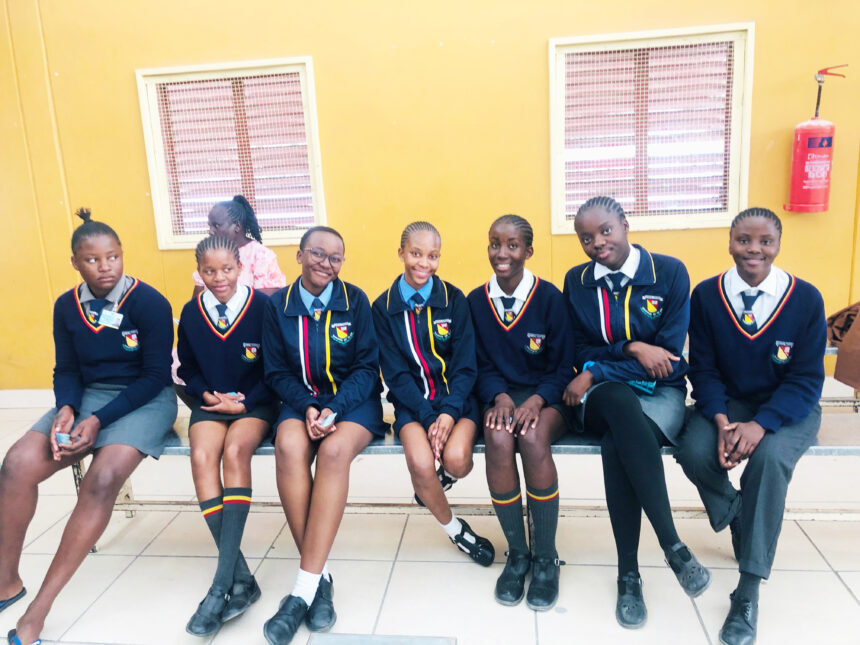Paulina Ndalikokule
ONGWEDIVA – With just 10 days to go before the Electoral Commission of Namibia wraps
up the general registration of voters, high school learner Ottlie Sheelongo who just turned 18, is nervous.
She cannot wait to exercise her democratic right for the first time.
Sheelongo wants to elect a president who takes change seriously and cares about high-quality education for all children, but she is also worried about the outcome of the presidential race in November.
Sheelongo believes the country’s education should be technological and on gadgets like is the case in all other developed countries around the globe.
“So many things are online at this point and
as I get older, I am starting to learn that the decisions we make now are going to affect usin the future . Getting my voter’s card today means I have a responsibility towards my country,” she says.
Sheelongo and fellow first-time voters believe it is important for young people to participate in elections, not only to voice their opinions but also to develop good voting habits.
She is against social media warriors who are quick to agitate on bread-and-butter issues on virtual platforms but are nowhere to be seen, where it matters most: voting booths.
Another pupil, 18-year-old Heelen Kanambunga said major national and worldwide events, like the Covid-19 pandemic
that forced them into home-schooling was a blessing in disguise as it also
boosted young people’s political
awareness and involvement.
“We want leaders who will listen to us and look at us as youth of our generation who are given opportunities and not always being compared to the youth of their generation and the liberation struggle,” she said.
Even for Veronika Kanghondi, it is her first time voting.
The young learner representative councillor (LRC) for entertainment was all smiles as she looked at her voter’s card.
She wants a shift in the public’s mindset about vocational training institutions.
Kanghondi wants VTCs to be given the same importance as other the tertiary institutions, such as universities and technical colleges.
Many other learners expressed confusion with the current education system implemented in government schools especially Advanced Subsidiary (AS) level. They allege that leaders have not consulted, and no thorough investigations were made before the implementation.
“The biggest challenge we face is teachers who are not qualified to teach this curriculum,” a learner, Shilongo Alfeus said.
Other learners want to do away with textbooks and be given tablets, cellphones and laptops to take to class and like they refer it ‘that would be the Generation Z way of happy living in a democratic country’.
“We have computers in schools, but we don’t have access to them, let alone use them for research. It is very difficult for us to do research on different subjects,” another learner said.
Despite the ministry of education continuously getting the biggest chuck of the national budget, it still has many unresolvable challenges such proper school structures let alone enough schools and classes, enough textbooks and resources, enough teachers while the learner-teacher ratio remains a problem.
Last year New Era reported that the high failure rate of candidates who sat the 2022 national examinations, and about 80% of the candidates who sat the Namibia Senior Secondary Certificate Ordinary and the AS levels failing to qualify for admission to tertiary institutions.
The youth are a growing portion of the electorate and first-time voters who are expected to make their debut in the 2024 elections. But voter registration turnout among young people is low, according to reports.
According to latest census findings, youthful population dominated Namibia’s 2023 census preliminary results where 71.1% of population is under age 35 and 39% of that is unemployed.
The Electoral Commission of Namibia (ECN) expects to register 1,7 million eligible voters, however only 823 761 eligible Namibians have registered as voters. The ECN has noted a slight improvement with approximately 147 371 increases in voter registration turnout during the week of 1-6 July 2024 but the commission is still concerned about the overall low turnout nationwide.
The ECN has urged all eligible Namibian citizens who have not yet registered to do so in the next three weeks before the GRV period deadline.
Namibians have been reminded there will be no extension of the voter registration period. The registration will continue across the country and at all Namibian diplomatic missions abroad until 01 August 2024, Monday to Saturday from 8h00 to 19h00.


